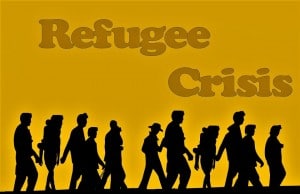 When refugees flee whatever horrors they are fleeing their own land and go somewhere else, they have to live without a lot of things that they were used to, such as access to adequate amounts of water for drinking, sanitation, food preparation and whatever else.
When refugees flee whatever horrors they are fleeing their own land and go somewhere else, they have to live without a lot of things that they were used to, such as access to adequate amounts of water for drinking, sanitation, food preparation and whatever else.
While every effort is made to supply refugees with at least the basic human rights, many countries are not equipped to do so, and many regions are not set up for transporting huge amounts of water to thousands of new settlers in the area.
This is where teaching refugees water management and training them to become water systems operators is a fantastic idea. That way they can add to what is available to their communities and also help train others in the best use of water; how to boil water before drinking, the necessity of cleaning their containers before use, how to recycle and reuse water, and much more.
This has been adequately proven in Uganda, where 27-year-old Iraguha Nkuriza Ferecian, who has been a refugee since fleeing from attacks on his family and neighbours in the Democratic Republic of the Congo 18 years ago. Iraguha got an UNHCR scholarship to study at secondary school, and then underwent specialist training to become a water systems operator; now he is giving back and earning an income at the same time.
Uganda does not keep its refugees in camps, but permits them to live in settlements that are indistinguishable from local villages, and to farm for themselves. One of these settlements, Nakivale, is massive, and where Iraguha lives and works as a water system operator for UNHCR, which provides around 68,000 refugees and asylum-seekers and around 16,000 Ugandans who live beside the refugees in the settlements, with clean water.
Iraguha support his elderly, disabled parents and four younger siblings with his earnings from working at the UNHCR water purifying plant and has the satisfaction of knowing that he can make a difference in his community. He supervises seven other workers and reports any problems to UNHCR staff.
Iraguha pours carefully measured chemicals into 3 large metal vats of scummy Lake Nakivale water, and climbs back down the rickety ladder knowing that in a mere 3 hours this purified water will find its way into several cement holding tanks and will then flow along pipes to communal taps throughout the vast settlement. The taps are managed by the refugees themselves through water committees, who are thankful that they have water that can be used for drinking, cooking, cleaning and agriculture so look after this life-giving resource very well.
Get bottled watercooler and watercooler from Living-Water. Rent watercooler and bottled water cooler in London.





